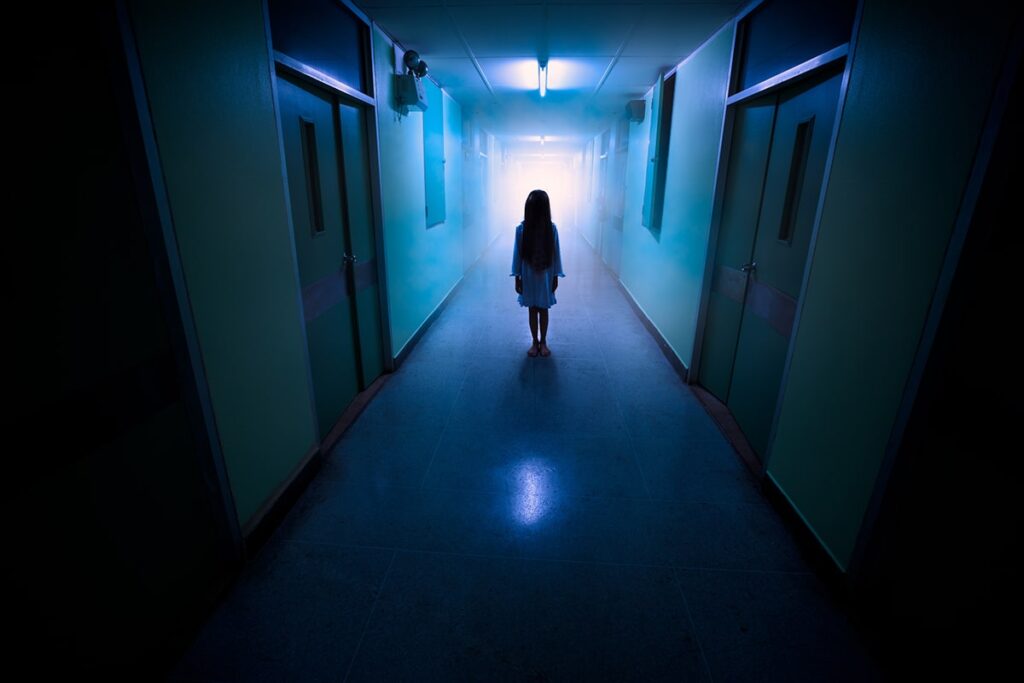Do you ever wake up from a terrifying dream, heart pounding and sweat dripping down your forehead? Nightmares can be a frightening experience, but understanding the facts behind them can help alleviate some of your fears.
In this article, we will explore the definition of nightmares, how often they occur, and the science behind them. We will also discuss the role of stress and medications, as well as provide coping strategies and prevention techniques to help you get a good night’s sleep.
The Definition of Nightmares

Nightmares are vivid, distressing and creepy dreams that you may experience during sleep. They can leave you feeling frightened, anxious, and even physically restless. Understanding the definition of nightmares is important in order to recognize and address them.
Nightmares are different from regular dreams in that they cause intense emotions and can often be remembered upon waking. They typically occur during REM (rapid eye movement) sleep, which is the stage of sleep when vivid dreaming occurs.
Nightmares can be triggered by various factors, such as stress, trauma, medication, or even certain foods. It’s essential to note that nightmares are a normal part of sleep and are experienced by most people at some point in their lives.
Facts About Nightmare Frequency and Occurrence
Now let’s look into how often nightmares occur and what factors can contribute to their frequency.
Nightmares can happen to anyone, but they’re more common in children and adolescents. Studies have shown that around 50% of children between the ages of 3 and 6 experience nightmares. As children grow older, the frequency of nightmares tends to decrease.
Stress and anxiety can also play a significant role in nightmare occurrence. People who experience high levels of stress or have anxiety disorders are more likely to have nightmares.
In addition, certain medications, substance abuse, and sleep disorders such as sleep apnea can increase the likelihood of nightmares.
It’s important to address any underlying issues and practice good sleep hygiene to reduce the frequency of nightmares.
Nightmares Vs. Night Terrors
To understand the difference between nightmares and night terrors, let’s explore their distinct characteristics and how they manifest during sleep.
Nightmares are vivid and disturbing dreams that cause fear, anxiety, or sadness. They usually occur during REM sleep and are often easily remembered upon waking.
Night terrors, on the other hand, are intense episodes of fear and panic that occur during non-REM sleep. Unlike nightmares, night terrors aren’t dreams but rather sudden awakenings characterized by screaming, sweating, and rapid heart rate. Individuals experiencing night terrors may appear confused or disoriented and have no recollection of the episode upon waking.
While nightmares can be distressing, night terrors can be more severe and may require medical attention if they become frequent or interfere with sleep.
The Science Behind Nightmares
Understanding the science behind nightmares can provide insight into why these vivid and disturbing dreams occur during REM sleep. During REM sleep, the brain is highly active, and this is when most dreaming occurs. Nightmares are believed to be a result of the brain processing and dealing with emotional experiences and stressors.
When you experience a nightmare, the amygdala, which is responsible for processing emotions, becomes hyperactive. This leads to the release of stress hormones, such as adrenaline, which can further intensify the emotional response. Additionally, the prefrontal cortex, which is responsible for rational thinking and decision-making, is less active during REM sleep, making it difficult to differentiate between dreams and reality.
This lack of control and logical thinking contributes to the intense and often terrifying nature of nightmares.
The Role of REM Sleep in Nightmares

During REM sleep, your brain’s activity level is high, contributing to the occurrence of nightmares. REM, which stands for Rapid Eye Movement, is a stage of sleep where vivid dreaming takes place. This is when your brain becomes highly active, similar to when you’re awake. As a result, your mind can create intense and sometimes frightening scenarios that manifest as nightmares.
During REM sleep, your brain also shuts down certain areas responsible for rational thinking and self-awareness. This lack of control can make nightmares feel more real and terrifying. Additionally, the physiological changes that occur during REM sleep, such as increased heart rate and breathing, may further amplify the intensity of nightmares.
Understanding the role of REM sleep in nightmares can help shed light on why they occur and how to potentially manage them.
Common Nightmare Themes
Nightmares can encompass a range of common themes that can be unsettling and distressing. These themes often tap into our deepest fears and anxieties, manifesting in various ways during sleep.
One common nightmare theme is falling, where you may experience the sensation of plummeting from a great height. This can evoke feelings of helplessness and insecurity.
Another frequent theme is being chased or pursued by a menacing figure or creature. In these nightmares, you may feel a sense of fear and urgency as you desperately try to escape.
Other common nightmare themes include being trapped or suffocated, experiencing physical harm or injury, and encountering supernatural or paranormal phenomena. These themes can leave you feeling shaken and disturbed upon waking, highlighting the power of our subconscious mind to create terrifying dream scenarios.
Facts About Nightmares and Trauma
If you have experienced trauma, nightmares can persist for an extended period of time. Trauma can have a profound impact on your sleep patterns, leading to recurrent nightmares that can be distressing and disruptive.
Research has shown that individuals who’ve experienced trauma are more likely to have nightmares compared to those who haven’t. Nightmares related to trauma often involve the re-experiencing of the traumatic event, causing intense fear, anxiety, and distress during sleep. These nightmares can be vivid and realistic, making it difficult to differentiate between the dream and reality upon waking up.
Furthermore, nightmares resulting from trauma can contribute to sleep disturbances, such as insomnia and frequent awakenings, further exacerbating the impact on your overall well-being.
Seeking therapy or counseling can be beneficial in addressing both the trauma and the nightmares associated with it.
The Psychological Impact of Nightmares
When experiencing recurrent nightmares related to trauma, the psychological impact can be significant and affect your overall well-being. Nightmares can evoke intense feelings of fear, anxiety, and distress, causing you to feel overwhelmed and unable to fully recover from the traumatic event.
These nightmares can disrupt your sleep patterns, leaving you feeling exhausted and irritable during the day. The constant replaying of distressing images and scenarios in your dreams can lead to increased levels of stress, anxiety, and even depression.
The psychological impact of nightmares can also affect your cognitive functioning, making it difficult to concentrate, remember things, or make decisions. Additionally, the emotional toll of nightmares can lead to a decrease in self-esteem and confidence, as well as a loss of interest in previously enjoyed activities.
It’s important to seek professional help and support to address the psychological impact of nightmares and work towards finding relief and healing.
Nightmares and Sleep Disorders
You may frequently experience sleep disturbances and disrupted sleep patterns due to nightmares, which can be indicative of a sleep disorder.
Nightmares can disrupt your sleep and leave you feeling exhausted and anxious during the day. If you consistently have nightmares that occur frequently and interfere with your ability to get a good night’s sleep, it may be a sign of a sleep disorder.
Sleep disorders such as nightmare disorder, sleep apnea, and insomnia can all contribute to the occurrence of nightmares. Nightmare disorder is specifically characterized by recurrent nightmares that cause distress or impairment in daily functioning.
It’s important to seek medical attention if your nightmares are causing significant distress or affecting your overall quality of life.
Nightmares and Mental Health
Nightmares can have a significant impact on your mental health. When you experience disturbing and distressing dreams, it can cause emotional distress and disrupt your overall well-being. Nightmares are often linked to mental health conditions such as anxiety disorders, post-traumatic stress disorder (PTSD), depression, and sleep disorders.
These vivid and intense dreams can trigger feelings of fear, helplessness, and unease, leading to heightened anxiety and stress levels throughout the day. If nightmares persist and interfere with your daily functioning, it’s essential to seek professional help. Mental health professionals can provide support and guidance to help manage and alleviate the negative effects of nightmares on your mental health.
Facts About Nightmares in Children
Did you know that nightmares can affect children’s mental health too?
Nightmares aren’t just limited to adults; they can be a common occurrence in children as well. In fact, research shows that nightmares are more prevalent in children than in adults.
These distressing dreams can have a significant impact on a child’s overall well-being. Nightmares in children can lead to problems such as sleep disturbances, fear of going to bed, and increased anxiety during the day.
Additionally, frequent or intense nightmares may contribute to the development of other mental health issues, such as anxiety disorders or post-traumatic stress disorder (PTSD).
It’s important for parents and caregivers to provide support and reassurance to children experiencing nightmares, and if necessary, seek professional help to address any underlying issues contributing to these distressing dreams.
Facts About Nightmares and Stress
Stress can play a significant role in the occurrence and intensity of nightmares. When you experience high levels of stress, your body is in a heightened state of arousal, making it more difficult to relax and sleep peacefully. This can lead to an increase in nightmares or make existing ones more vivid and disturbing.
The relationship between stress and nightmares is bidirectional, meaning that not only can stress trigger nightmares, but nightmares can also contribute to increased stress levels. This creates a vicious cycle where stress causes nightmares, and nightmares in turn cause more stress.
It’s important to find healthy ways to manage stress, such as practicing relaxation techniques, maintaining a regular sleep schedule, and seeking support from loved ones or professionals if needed, to reduce the occurrence and intensity of nightmares.
Nightmares and Medications
If you’re seeking relief from nightmares, exploring the role of medications can be a potential option. Certain medications can help reduce the frequency and intensity of nightmares.
One common medication used for this purpose is Prazosin, which is primarily prescribed for high blood pressure but has also shown effectiveness in treating nightmares associated with PTSD. Prazosin works by blocking certain receptors in the brain, reducing the adrenaline response that can trigger nightmares.
Another medication that may be used is an antidepressant called selective serotonin reuptake inhibitors (SSRIs). While primarily used to treat depression, SSRIs have been found to decrease the occurrence of nightmares.
However, it’s important to note that medications can have side effects and may not be suitable for everyone. Consulting with a healthcare professional is essential to determine the best course of action for managing nightmares through medication.
Coping Strategies for Nightmares
To effectively manage nightmares, you can employ various coping strategies that can help alleviate their impact on your sleep and overall well-being.
Firstly, establishing a consistent sleep routine can be beneficial. Try to go to bed and wake up at the same time every day to regulate your sleep patterns.
Secondly, creating a relaxing bedtime routine can help signal to your body that it’s time to unwind and prepare for sleep. This can include activities such as reading, taking a warm bath, or practicing relaxation techniques like deep breathing or meditation.
Additionally, practicing good sleep hygiene, such as keeping your bedroom cool, dark, and quiet, can promote better sleep quality and reduce the frequency of nightmares.
Lastly, seeking support from a therapist or counselor can be helpful in processing and managing the emotions and underlying causes of your nightmares.
Prevention Techniques for Nightmares
One effective way to prevent nightmares is by implementing a consistent sleep schedule. Going to bed and waking up at the same time every day helps regulate your body’s internal clock, promoting better sleep quality and reducing the likelihood of nightmares.
Another prevention technique is creating a relaxing bedtime routine. Engaging in calming activities like reading a book, taking a warm bath, or practicing deep breathing exercises can help relax your mind and prepare it for a peaceful sleep.
Additionally, it’s important to create a comfortable sleep environment. Make sure your bedroom is cool, dark, and free from noise or distractions that may disrupt your sleep.
See also our facts about dreams here.





